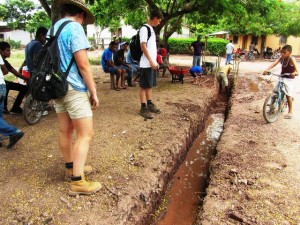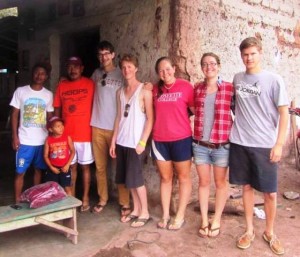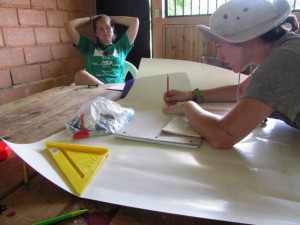By Michele Tallarita ’12
This summer, an interdisciplinary team of students and faculty worked with residents of Lomitas, Honduras, to help improve stormwater drainage in the village, which experiences regular flooding.

The water from the existing swale is diverted so work could be done on the next section.
The project is part of Lafayette’s Economic Empowerment and Global Learning Project (EEGLP), with funding from the National Science Foundation International Research Experience for Students. EEGLP takes a multidisciplinary approach toward community redevelopment. Teams of students and faculty from every academic division work hand in hand with residents to tackle real-world economic issues locally, nationally, and internationally. Anu Ghai, lecturer in economics and EEGLP faculty adviser, and David Veshosky, associate professor of civil and environmental engineering, headed this summer’s project.
The team focused its efforts on a school playground and soccer field in Lomitas. The location is vital to the community, bringing together neighboring villages for games and sparking economic activity by drawing vendors. The goal of the project was to keep the field usable during the rainy season, when it often floods.
Before traveling to Lomitas, students met with professional engineers Jackie Parodi ’10 and William “Tom” Barlow ’13 at local engineering firms, where the alums and other engineers helped them understand how to apply concepts from their coursework to the field’s flooding issue. Students also met with Sean Dooley of Keystone Consulting Engineers, who will teach Lafayette’s civil engineering senior design course this school year.

The students relax with some of the villagers.
Once in Honduras, students surveyed the field, analyzed the problem, designed improvements, and worked with the villagers to construct the improvements. These included deepening and widening drainage ditches, cleaning culverts, and installing grates over ditches. Through negotiations, students and a group of villagers, Youth for the Future, drew up a contract specifying students’ and villagers’ responsibilities. The local group agreed to maintain the project after competition.
“It was almost completely student run once we got to Honduras,” says team leader Carly Hatch ’14 (Hillsborough, N.H.), a civil engineering major. “Our professors were there for five days to help us get settled before they went home. So we really got the chance to learn how to manage a real-life engineering project, from writing a contract, to organizing labor, to buying supplies, to dealing with issues and problems that arose throughout the summer.”
One of the most inspiring experiences for Hatch was witnessing how invested the villagers were in the soccer field and school. The project was finished ahead of schedule because more workers contributed than expected and they worked more days and hours than originally agreed upon.

Team leader Carly Hatch ’14 works on plans for the soccer field
“It was awesome to watch the community come together to watch and help with the construction of the project,” she says. “Almost every day that we were at the field, the villagers would sit around the edges and watch the work being done.”
Having now returned to Lafayette, Cody Harnish ’14 (Lancaster, Pa.), who plans to work in civil engineering, feels the skills he learned will help him after he graduates.
“I can honestly say now that I would be confident in designing a stormwater management system,” he says. “Having completed this project makes me think that the theory from class is actually very much like what real engineers do.”
Other team members were Mike Bevilacqua ’14 (Chester, Pa.), a civil engineering major; Megan Richardson ’14 (Norfolk, Mass.), a mechanical engineering major; and Andrew Fixler ’14 (Middlesex, Mass.), a double major in economics and international affairs.



4 Comments
Brilliant work!!!! The most amazing thing about this project is how alums still collaborate with current students. To the students I say well done for improving the quality of living out there in Honduras. The resulting soccer field and playground are clear evidence for your passion to change the world around you, using your Lafayette education.
This is so cool! I’m still in high school, but it feels like this college may just be ‘the one’ for me. I find it so intriguing that the humanities are a big part of the Lafayette mission. Community service has been a big part of my life so when I read about people making such a big impact on even a small village, it makes me want to go out and do similar projects. I can feel the camaraderie between the students working on these projects, giving their input and improving on their ideas. I agree with Ms. Stephanie Soper when she states that the impact you made lies within yourselves, the students, and the community you helped in Honduras.
Sharing of expertise by Lafayette students with villagers was a great idea. Causes of flooding and the signs of past floods are difficult for people to understand, whatever their socio-economic background. This work is transferable to any municipality. Nice work!
Really, really impressive. You guys had a huge positive effect on that village — and on yourselves.
Comments are closed.